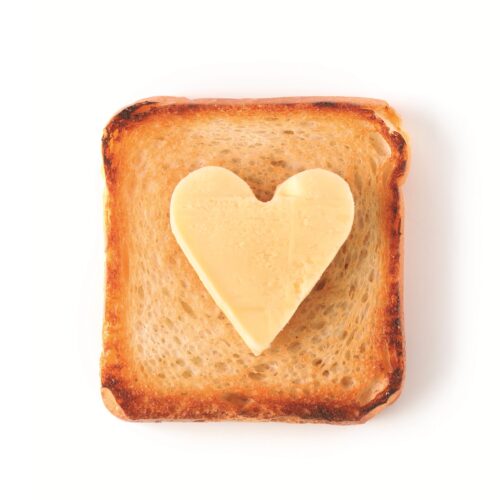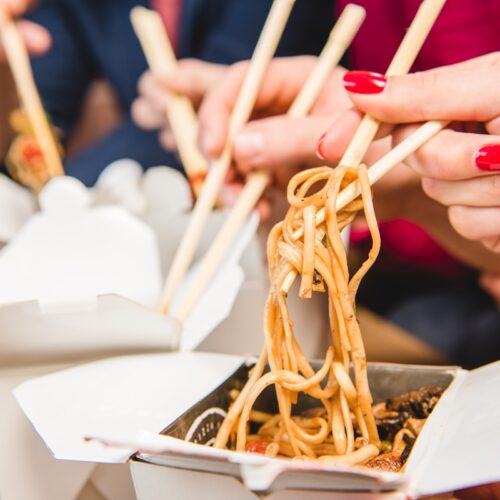
A big life change like weight loss can have unexpected consequences. Jenny Chapman has been there.
Getting to your goal weight and being physically fit and healthy may seem like the silver bullet to happiness. However, for many people who turn over the new leaf of healthier living, there are social ramifications that they didn’t bargain on. Many women, especially, experience a change in relationships and even lose friends when they have achieved their goals.
When I got married I was a comfy thing! I never exercised and ate whatever I wanted — and it showed. After having my three girls, the best stress management I found was walking with the kids and eating well. As a result, I lost nearly 20kg and I was a very different person. I became active and only put food in my mouth that supported my health, not took away from it. I also virtually stopped drinking alcohol.
Some people around me didn’t react with the praise and support I had hoped for. I dealt with comments like, “Go on! Just eat it! You’ll walk it off anyway!” One of the worst comments I got was, “You just think you’re so righteous, don’t you!?” This statement was hurtful, but it also got me really thinking what was it about the changes in my life that touched a nerve with other people, especially my bigger female friends and family.
Dr Rosemary Lyons, a clinical psychologist, says that it is important to first look at the relationship’s ‘big picture’ before looking at the specifics of why someone might not react the way you had wished.
“A relationship is a dynamic two-way interaction that is developed over time and serves purposes for both parties,” she says. “People tend to develop friendships that support their lifestyle or purposes. For example, people develop friendships based on similar interests such as sport, religious beliefs or hobbies. People also seek out others who help to maintain a preferred lifestyle. Parents with young children often socialise together because they share similar problems, understand and can support each other. Similarly, people who wish to maintain a particular eating lifestyle will seek out those who can support them in it. A person with excessive eating could develop a friendship in which she plays the ‘fat friend’ and the other person plays the ‘skinny friend.’ The dynamic is such that both people have gains from the relationship: the excessive eater’s food consumption habits are accepted and it may be the other person feels good about themselves for accepting the overweight person as a friend and their own social status is enhanced by the contrast in body shapes.”
Our interconnected web of family, friends, workmates and acquaintances can be thought of as a finely balanced hanging mobile (like one that hangs over a baby’s cot). When a piece is pulled the whole system becomes unbalanced and disturbed until it finds its new equilibrium. Similarly, losing a significant amount of weight can be thought of as creating a significant disturbance in the balance of relationships.
“Naturally, people who were in a relationship with a person who has lost weight will want things to go back to the way they were before because that is what they knew, were comfortable with and it had supported their own purposes,” says Dr Lyons.
I have spoken to many ‘healthy living converts’ who have experienced reactions from friends that were different to what they had presumed they would be. Bridget, who has lost more than 40kg through Weight Watchers, has not experienced the enthusiastic support she had hoped for. She says, “I expected some external validation, but clearly people subscribe to the practice of not saying anything if they don’t know what to say.
“People seem to want me to have some magical ‘trick’— like I gave up processed sugar or I went vegan or [I followed] a specific exercise regimen — and they’re a bit disappointed when I reveal my big secret is nothing more than moving more and eating less.”
Andrea, who has lost more than 50kg using Sureslim and exercise, has not only lost friends but she has experienced bullying at work and efforts of sabotage from her co-workers.
She says, “When I was at a shared morning tea… all of the food on the table was either sugar or fat laden and just didn’t fit in with my plan, [but] one co-worker told me to ‘just ****ing eat something!’
“On another occasion, the same workmate told me that I was ‘obsessed with exercise’ in front of several people in the office.”
There are many reasons why a friend may be affected by your weight-loss and healthier lifestyle. Perhaps the most obvious reason is that when one friend works on their flaws, the other’s flaws are highlighted in their mind and they may also take this as a personal judgement. Other things like your changing priorities can make friends feel displaced.
Andrea experienced difficulties when her priorities and goals changed. “I no longer indulged in the same ways, through food or alcohol,“ she says, “and this was always hard — especially when someone had gone to a lot of effort to make something for me that I just couldn’t eat.
“My priorities just changed. When I would go home for a break going for a run was a priority and I really wanted my friends to get that but sometimes, I know they were put out.”
So how can you prepare yourself and cope with changing friendships and relationships?
Strategies to cope with changing relationships
Look at yourself
Is it just your size, shape and fitness levels that are changing or are you contributing to making people feel ‘less’ around you? If you make a point of telling your friends about your journey every time you see them this can inflame the situation. Go about it quietly and let the results speak for themselves. Don’t go fishing for compliments.
Connect with people who will support you
I made friends with people from my gym because that way I automatically knew they had similar goals to me.
You can’t change other people
I learnt this the hard way by preaching to people about how they could ‘easily’ lose weight just by cutting out fast foods, sugary drinks and alcohol… this never went down well!
You teach people how to treat you
Don’t let people tell you what you should be doing and don’t eat something you don’t want to just to be polite.
Invite them along on a run
You would be surprised how many people just want an excuse to start exercising! I invited a friend to come and do the Tough Gal challenge with me this year and now she is determined to complete a Half Iron Man!
Tell them they are important to you…
But so is living longer in a healthy way. Ask the person how you could do it together.
You could also take the head-on approach and call them on it
“Do you hate it that I’m losing weight?” It could be a make or break call but is what you have a real friendship anyway?
In the end, we all choose our relationships because we either consciously or subconsciously get something from the relationship. If you no longer need what you used to get from the relationship, like a drinking buddy or a fellow fast food connoisseur, then maybe the relationship is no longer a priority for you. Look at all of your relationships in terms of how they add to your life. If it is just too hard then maybe it is just not meant to be.
Relationships can be for a time, a reason or a season or if you’re really fortunate, for a lifetime. You can choose what is best for you.
www.healthyfood.com











